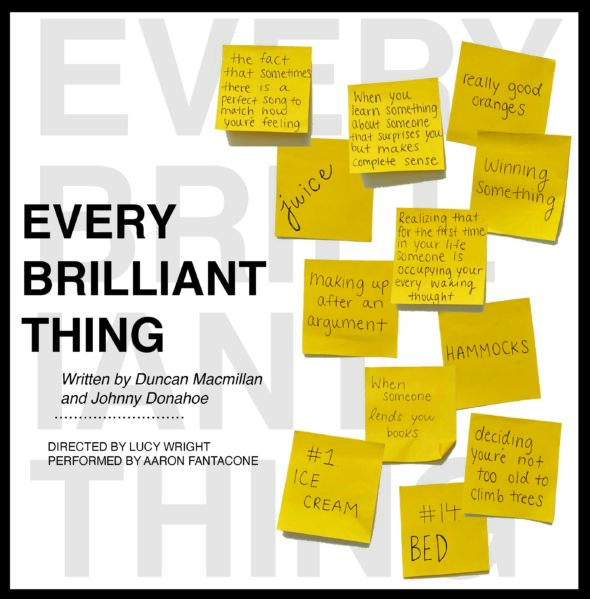By Alexis Bensoussan
When you need to remind someone of all the brilliant things life has to offer, ice cream might be No. 1 on the list.
A one-man show that gives us the complete list of those things, “Every Brilliant Thing,” is coming to Flagler College’s stage.
The play will be performed in the Lewis Auditorium on March 10 at 7:30 p.m. with free admission.
“Every Brilliant Thing” is a play by Duncan Macmillan and Jonny Donahoe that tracks the life of the narrator from childhood to his mid to late 30s. At the age of 7, he starts creating a list for his mother of all the things that are brilliant in the world.
The list later helps the narrator to navigate his own life.
Aaron Fantacone is a 21-year-old Flagler College senior who is playing the narrator—and the only character—of this show.

The show touches on sensitive topics, such as suicide and depression. But the play’s director, Flagler College senior Lucy Wright, says those things are not the only takeaways.
“The show obviously talks about suicide quite a bit. It’s easy for the show to become a show about suicide. But that’s not what this show is at all,” Wright said. “I’ve never seen a show about suicide or about depression that covers it in such a lighthearted and joyful way. That’s why I think it is so impactful.”
Wright says “Every Brilliant Thing” could even be defined as a comedy, given the humorous nature of the text.
“Every Brilliant Thing” throws many challenges Fantacone’s way, such as having to adapt to a new, out-of-the-ordinary way of acting. For one, the show is set in the round with chairs on all four sides of the stage.
Audience participation is imperative for the success of the show. “We’ve been trying to simulate how the show is gonna be as much as possible. So, we set up the chairs on all four sides, we invite random people who have no idea what’s going on and we get them to participate in the show as if it’s an actual show,” Fantacone said.
“You have to really throw away any theatrical conventions such as, face the audience, don’t turn your back towards them. And you really want to make a personal connection with them. You’re not playing a character; you’re really just sitting there, telling a story.”

Fantacone also must memorize roughly 38 pages of text, performing on stage all by himself. Well, with the help of a few audience members.
The director is passionate about the messages she wants the audience to garner from their experience watching this show.
“The message that I really want to convey is, ‘It’s okay to not be okay,’” Wright said. “A lot of times, if you feel depressed, you feel like you’re broken and that you need to be fixed; there’s something wrong that needs to change. And that’s not true.”
“Things are not going to be brilliant all the time. There will be moments of brilliance, like ice cream, or water fights or all of these small things,” she said. “But things will always get better from where you are. I think that’s really important to remember.”
Though there are sensitive topics discussed in the play, Fantacone and Wright note how it also helps viewers to notice the little things in life.
“Even though, yes, it’s a show that has subjects of suicide and subjects of depression, there’s always these seeds of humor and joy that seep through,” Fantacone said.
Being able to connect to a story can be a critical component of theatre, and both the actor and director can relate in their own ways.
“Having lost my sibling to suicide, even though I’m not the character of the narrator myself, it’s almost like telling my own story. It’s very personal to me. And, in a way, it almost feels like I’m not just leaving them behind,” Fantacone said.
For Wright, this play was a crutch when she lost a friend to suicide.
“I had a friend last year who unfortunately did commit suicide. I went back to this play and read it like, 30 times after that happened. I was able to find the joy and make a list of brilliant things about her that I could remember,” she said.
Fantacone hopes that the audience will be struck with a changed mindset on mental health and that “Every Brilliant Thing” inspires people to not be afraid to talk about depression and suicide.
“Suicide and depression are just such taboo subjects. I think people are just scared to talk about it,” he said. “It shouldn’t be taboo. It shouldn’t be ignored. It shouldn’t be a thing you whisper. It should be out there, and people should realize: Don’t ignore the complexities of those affected by suicide and those left behind.”
Both Fantacone and Wright are incredibly excited to put on display all the hard work they have put into this show.
“I can’t imagine a better way for my last semester to be spent,” Wright said.
There are many messages that “Every Brilliant Thing” intends to share, but Fantacone believes one line from the show sums it all up perfectly.
“‘Things can get better,’” he said. “‘They may not always get brilliant, but they get better.’”





Be the first to comment on "“Every Brilliant Thing”: Flagler Theatre Majors Use Creative Outlet for Story About Mental Health"